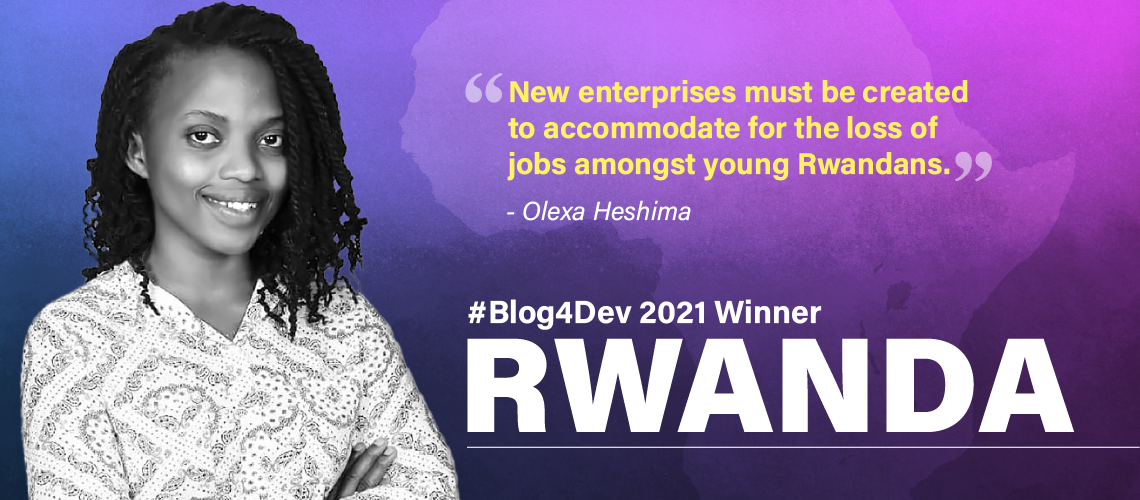 Olexa Heshima, winner of the 2021 Blog4Dev competition for Rwanda.
Olexa Heshima, winner of the 2021 Blog4Dev competition for Rwanda.
This is one of 38 winning blogs from the 2021 Blog4Dev competition, the World Bank Africa annual writing contest, inviting young people to weigh in on a topic critical to their country’s economic development. Blog4Dev winners responded to the question: How can young people work with their governments and civil society organizations to respond to the impact of COVID-19 and build a stronger post-pandemic economic and social system?
While Rwanda might have been detrimentally affected by the COVID-19 (coronavirus) pandemic, both economically and socially, it is essential to notice that the country had a robust basis to manage the crisis. A strong basis ranging from good leadership to a clear vision, from focus on innovation to well-functioning institutions, and from adequate social protection mechanisms to a reliable data system necessary for data analysis. Leveraging on these opportunities and other available resources such as the fourth industrial revolution technologies, young Rwandans can work together with their government and civil society organizations to allow the country to leapfrog from the challenges presented by COVID-19.
Provided the unemployment impacts of COVID-19 on young Rwandans, particularly those who were working in less labor-intensive sectors outside agriculture, forestry, and fishing, new enterprises must be created to accommodate for the loss of jobs amongst young Rwandans . Through challenging orthodoxies, young Rwandans can develop an innovative and entrepreneurial mindset to leverage the opportunities presented by the pandemic and collaboratively come together in cooperatives to create new legal sources of income for themselves. By putting laid-off workers and micro-entrepreneurs at the center, the Rwandan Government can support these young people through the provision of grants and allowance to credit from banks and other youth initiatives, to kick-start their entrepreneurial careers. In the tourism sector, for instance, young Rwandans could implement digital tools such as virtual reality, augmented reality, and artificial intelligence to bring back foreign earnings lost during the pandemic.
Additionally, due to school closure in Rwanda to prevent the spread of the COVID-19 pandemic, the number of teenage pregnancies has increased significantly. Through emotional intelligence, young boys and girls can help solve this issue. With a substantial self-awareness level, they will prevent themselves from engaging in sexual activities at a young age that do not align with their life plans. Fortunately, with the Rwanda's National Reproductive Health policy that prioritizes adolescent reproductive health, these young girls and boys have a strong basis for understanding the importance of sexual reproductive health and seek assistance when needed.
Moreover, through volunteerism and actively engaging in advocacy and awareness campaigns against gender-based violence, for instance, young Rwandans can help the vulnerable, such as women, the elderly, the poor, and persons with disabilities, particularly affected by the COVID-related disruptions. Volunteerism will ensure continued care provision to the elderly and persons with disabilities while minimizing government spending on paid caregivers.
Furthermore, through digital innovation, young Rwandans can help SMEs out of the poverty imposed on them by the pandemic. For instance, they could bring financial services to the informal sector, since the pandemic has forced many SMEs to work under the informal sector, while others are on the verge of losing their jobs, hence, forced out of their formal insurance schemes. The Rwandan Government can assist in policy reforms that support a boost in internet efficiency, affordability, and network expansion.
Olexa Heshima is the 2021 Blog4Dev winner from Rwanda. See the full list of 2021 Blog4Dev winners here, and read their blog posts.


Join the Conversation